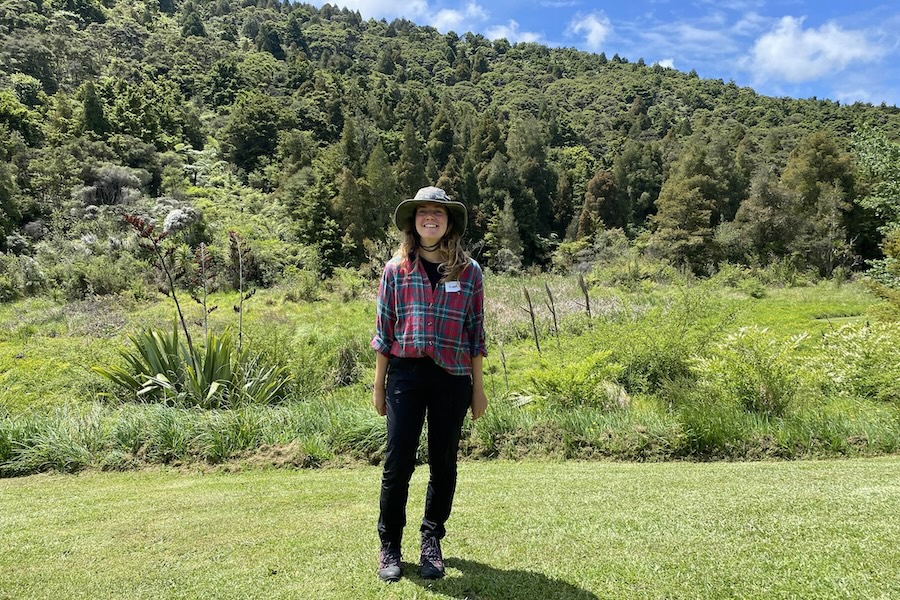It’s now for nature
Pictured above: Gemma Coate.
Gemma Coate, SBN’s Programme Manager for Regenerating Nature, explains what nature means to her and why businesses need to take nature action now.
Moving to Aotearoa New Zealand was a lifelong dream of mine. I grew up in the home counties surrounding London and spent most of my working career in a city of 8.9 million people. I’ve always been fascinated by this country’s unique nature and wildlife from books, photos, documentaries and even the Lord of the Rings trilogy.
Protecting nature and wildlife has always been my main motivation for working in corporate sustainability. I still have a distinct memory of sitting cross-legged on the cold, hard floor during a junior school assembly, somewhere between the age of seven and 11, and being shown images of the destruction of the rainforest and homes of orangutans for vast monocrop palm oil plantations. I remember feeling desperately sad and hopeless. Those memories have stayed deeply ingrained.
Since moving here, I have had the privilege of exploring this country’s incredible flora and fauna. From the cheeky keas circling overhead whilst trying to wolf down a campsite dinner at Brewster Hut, to the incredible experiences of spotting a blue whale and swimming face to face with dolphins in Kaikōura, to looking up at a 1,200 year old kauri tree in the Coromandel. I feel incredibly grateful for all these experiences.
It’s clear to me that as a country New Zealand’s culture is deeply intertwined with nature – oceans, freshwater, land and atmosphere. All of which are underpinned by biodiversity, the variety of living organisms, including animals, plants, fungi and microorganisms. But it’s still hard to comprehend sometimes how much of our everyday lives are so dependent and reliant on nature and biodiversity.
One way of exploring this dependency is to look at nature’s ecosystem services, which are the direct and indirect benefits we derive from healthy ecosystems and native species. For example, provision services refer to the supply of clean water, timber, fibre, medicinal plants and energy. Cultural services refer to recreational activities, tourism opportunities and our cultural and mental wellbeing. Regulating services refer to the pollination undertaken by bees, natural pest control, soil stabilisation, flood protection and carbon sequestration.
Sadly, many of these ecosystem services have been undervalued. Threats including invasive species, climate change, land use change, direct exploitation and pollution have led to a rapid decline in biodiversity. The recent Ministry for Environment report painted a sobering picture of the number of species threatened with extinction or at risk of becoming threatened: 76 percent of freshwater fish, 68 percent of freshwater birds, 78 percent of terrestrial birds, 93 percent of frogs, and 94 percent of reptiles.
But this decline can be halted. There is a growing movement globally to tackle the dual crises of biodiversity loss and the climate crisis. Nature positive has become the rallying cry and is the global goal to halt and reverse biodiversity loss by 2030 and achieve full recovery by 2050. This goal was set in 2022 when 196 countries agreed to work together to achieve the Global Biodiversity Framework. This included New Zealand.
As a society, we need to address nature, climate and equity. Nature is part of the climate solution but it’s also impacted by the climate crisis. Healthy ecosystems, such as forests, wetlands and oceans, act as critical carbon sinks, absorbing carbon dioxide from the atmosphere. In addition, diverse ecosystems are more resilient to climate impacts and better equipped to provide essential services like flood protection, soil stabilisation and crop pollination. One is a solution to the other.
Businesses have a key role in helping halt and reverse biodiversity loss. That starts by understanding their impacts and dependencies on nature. At the Nature and Business Symposium 2025 taking place on August 6, in Auckland, we will focus on how businesses can take action for nature. It doesn’t matter if you’re starting out, embedding within an existing sustainability strategy, or even looking at the Taskforce on Nature-related Financial Disclosures (TNFD), we can help you integrate nature into your business.
The Symposium includes an optional half-day field trip on August 5, the day before the main event. This will be a great chance to see first-hand how community groups work with businesses on nature projects. The following day includes a full programme of inspiring presentations, panels, interactive workshops and great networking opportunities. You’ll leave with an understanding of how to take meaningful action for nature in your business now.
An underlying theme of this year’s Symposium is that it’s time we started giving back to nature rather than talking all the time. It’s now for nature is a joint global campaign to bring together all businesses to act on nature and contribute towards the nature positive goals by 2030.
Learn more about the Nature and Business Symposium 2025, run by the Sustainable Business Network. Book your early bird tickets and save $200 +GST on the full price.



